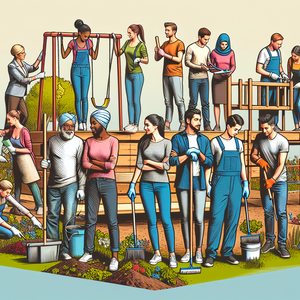The Legacy of Nobel's Wealth: From Fortune to Philanthropy

Born in 1833 in Stockholm, Sweden, Alfred Nobel was a chemist, engineer, and inventor whose most notable contribution to humanity was the invention of dynamite. This invention, while revolutionary for construction and mining, also had a darker side due to its military applications. Despite amassing considerable wealth from his inventions, it was Nobel's decision to dedicate a significant portion of his fortune to the establishment of the Nobel Prizes that solidified his legacy. This article explores the reasons behind Nobel's philanthropic shift and the profound impact it has had on various sectors of society.
The Shift from Wealth to Philanthropy
Nobel's decision to create the Nobel Prizes was rooted in a combination of personal experiences and societal reflections. A pivotal moment occurred when he read an obituary that mistakenly identified him as a "merchant of death" due to his invention of dynamite. This prompted him to contemplate how he would be remembered after his death. The realization that his legacy could be viewed negatively due to the destructive potential of his inventions spurred him to seek a more positive remembrance. In his will, Nobel allocated the majority of his fortune—approximately 31 million Swedish kronor (equivalent to hundreds of millions today)—to the establishment of the Nobel Prizes. This remarkable act of philanthropy was aimed at rewarding individuals and organizations that contribute positively to humanity. The prizes are awarded annually in fields such as Physics, Chemistry, Medicine, Literature, and Peace, embodying Nobel's desire to recognize and promote achievements that benefit mankind.
Impact on Science and Medicine
The Nobel Prizes have had a significant impact on scientific and medical advancements. Notable winners, such as Marie Curie, who won the Nobel Prize in Physics in 1903 and later in Chemistry in 1911, have paved the way for groundbreaking research in radioactivity. The acknowledgment of scientists through the Nobel Prize not only provides them with recognition but also encourages further research and development in their respective fields. Moreover, the Nobel Prize in Medicine has highlighted critical advancements, such as the discovery of penicillin by Alexander Fleming in 1928, which revolutionized medicine and saved countless lives. This recognition sparked greater interest in antibiotic research and development, leading to the creation of numerous life-saving medications. By rewarding these monumental contributions, Nobel ensured that future generations would continue to strive for excellence in science and medicine.
Literature and Peace
The impact of the Nobel Prizes extends beyond science; it has also profoundly influenced literature and peace efforts. The Nobel Prize in Literature has recognized authors who explore complex human experiences and societal issues, such as the plight of marginalized communities or the nuances of cultural identity. Writers like Gabriel García Márquez, who won in 1982, and Toni Morrison, awarded in 1993, have used their platforms to address themes of identity, culture, and justice, inspiring readers worldwide to reflect on their own experiences and societal structures. Additionally, the Nobel Peace Prize has become a prestigious accolade for individuals and organizations working towards conflict resolution and humanitarian efforts. Figures such as Martin Luther King Jr., who received the prize in 1964, and Malala Yousafzai, awarded in 2014, exemplify the spirit of the prize. Both have used their recognition to advocate for change and raise awareness about global issues, such as civil rights and education for girls, respectively. The Peace Prize not only honors these individuals but also serves as a platform for broader movements advocating for peace and equity worldwide.
Alfred Nobel's transition from a wealthy inventor to a philanthropist reshaped his legacy and established a framework for recognizing human achievement. By creating the Nobel Prizes, he transformed his fortune into a beacon of hope and inspiration for countless individuals across various fields. The impact of his decision continues to resonate today, as the prizes encourage ongoing innovation, creativity, and efforts toward peace and understanding. In a world often overshadowed by conflict and division, Nobel's legacy serves as a reminder of the enduring power of philanthropy in fostering positive change for humanity.
Philanthropy Program Manager
Bill & Melinda Gates Foundation, non-profits, corporate social responsibility departments
Core Responsibilities
Develop and implement programs that align with the organization's mission and philanthropic goals.
Evaluate the impact of funded initiatives and report on outcomes to stakeholders.
Manage relationships with grantees and community partners to ensure effective collaboration.
Required Skills
Strong project management and communication skills.
Experience in grant writing and fundraising strategies.
Familiarity with nonprofit regulations and compliance.
Corporate Social Responsibility (CSR) Specialist
Unilever, Coca-Cola, Google
Core Responsibilities
Design and execute CSR strategies that promote sustainable business practices and community engagement.
Conduct assessments to gauge the social impact of the company's operations and community initiatives.
Collaborate with marketing and public relations to communicate CSR efforts to stakeholders.
Required Skills
Knowledge of sustainability practices and ethical business standards.
Proficient in data analysis and reporting for CSR metrics.
Ability to engage and influence internal and external stakeholders.
Nonprofit Grant Writer
Nonprofit organizations, foundations, educational institutions
Core Responsibilities
Research and identify potential funding sources for nonprofit initiatives and programs.
Write compelling grant proposals that clearly articulate the organization's mission and funding needs.
Maintain relationships with funding agencies and provide updates on project progress.
Required Skills
Exceptional writing and editing skills, with a knack for storytelling.
Understanding of grant application processes and requirements.
Strong organizational skills to manage multiple proposals and deadlines.
Social Impact Analyst
Research institutions, think tanks, nonprofits
Core Responsibilities
Analyze data and trends related to social issues and evaluate the effectiveness of programs aimed at addressing these issues.
Prepare reports and presentations to communicate findings to stakeholders and influence policy decisions.
Collaborate with cross-functional teams to develop data-driven strategies for impact.
Required Skills
Proficiency in statistical analysis software and data visualization tools.
Strong research skills and the ability to synthesize complex information.
Excellent communication skills to present findings to diverse audiences.
Public Relations Specialist in Nonprofit Sector
Nonprofit organizations, advocacy groups, charities
Core Responsibilities
Develop and implement public relations strategies to enhance the organization’s visibility and reputation.
Manage media relations, including writing press releases and responding to media inquiries.
Create and oversee content for various platforms, including social media and newsletters, to engage donors and the community.
Required Skills
Strong writing and editing skills, with a keen understanding of messaging for different audiences.
Experience with digital marketing and social media management.
Ability to work collaboratively with teams and stakeholders to achieve communication goals.


